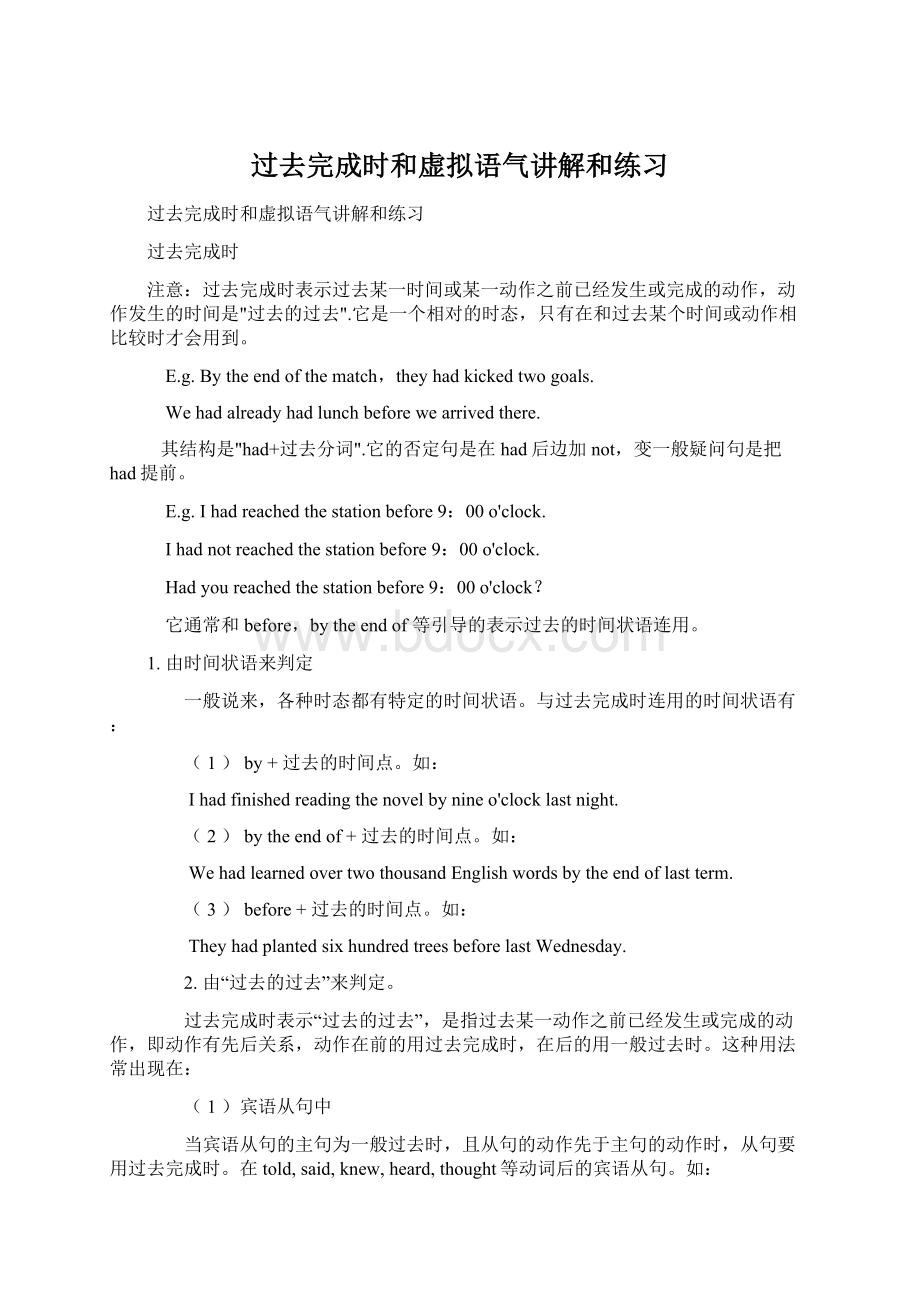过去完成时和虚拟语气讲解和练习.docx
《过去完成时和虚拟语气讲解和练习.docx》由会员分享,可在线阅读,更多相关《过去完成时和虚拟语气讲解和练习.docx(11页珍藏版)》请在冰豆网上搜索。

过去完成时和虚拟语气讲解和练习
过去完成时和虚拟语气讲解和练习
过去完成时
注意:
过去完成时表示过去某一时间或某一动作之前已经发生或完成的动作,动作发生的时间是"过去的过去".它是一个相对的时态,只有在和过去某个时间或动作相比较时才会用到。
E.g.Bytheendofthematch,theyhadkickedtwogoals.
Wehadalreadyhadlunchbeforewearrivedthere.
其结构是"had+过去分词".它的否定句是在had后边加not,变一般疑问句是把had提前。
E.g.Ihadreachedthestationbefore9:
00o'clock.
Ihadnotreachedthestationbefore9:
00o'clock.
Hadyoureachedthestationbefore9:
00o'clock?
它通常和before,bytheendof等引导的表示过去的时间状语连用。
1.由时间状语来判定
一般说来,各种时态都有特定的时间状语。
与过去完成时连用的时间状语有:
(1)by+过去的时间点。
如:
Ihadfinishedreadingthenovelbynineo'clocklastnight.
(2)bytheendof+过去的时间点。
如:
WehadlearnedovertwothousandEnglishwordsbytheendoflastterm.
(3)before+过去的时间点。
如:
TheyhadplantedsixhundredtreesbeforelastWednesday.
2.由“过去的过去”来判定。
过去完成时表示“过去的过去”,是指过去某一动作之前已经发生或完成的动作,即动作有先后关系,动作在前的用过去完成时,在后的用一般过去时。
这种用法常出现在:
(1)宾语从句中
当宾语从句的主句为一般过去时,且从句的动作先于主句的动作时,从句要用过去完成时。
在told,said,knew,heard,thought等动词后的宾语从句。
如:
Shesaidthatshehadseenthefilmbefore.
(2)状语从句中
在时间、条件、原因、方式等状语从句中,主、从句的动作发生有先后关系,动作在前的,要用过去完成时,动作在后的要用一般过去时。
如:
Afterhehadfinishedhishomework,hewenttobed.
注意:
before,after引导的时间状语从句中,由于before和after本身已表达了动作的先后关系,若主、从句表示的动作紧密相连,则主、从句都用一般过去时。
如:
Afterheclosedthedoor,helefttheclassroom.
(3)表示意向的动词,如hope,wish,expect,think,intend,mean,suppose等,用过去完成时表示"原本…,未能…"
Wehadhopedthatyouwouldcome,butyoudidn't.
3.根据上、下文来判定。
ImetWangTaointhestreetyesterday.Wehadn'tseeneachothersincehewenttoBeijing.
单项选择
1.Heaskedme_____duringthesummerholidays.
A.whereIhadbeen B.whereIhadgone
C.wherehadIbeen D.wherehadIgone
2.What____Jane____bythetimehewassever?
A.did,do B.has, done Cdid,did. D.had, done
3.I______900EnglishwordsbythetimeIwasten。
A.learned B.waslearning C.hadlearned D.learnt
4.She______livedherefor______years.
A.had, afew B.has, several C.had, alotof D.has, agreatdealof
5.Bythetimemyparentsreachedhomeyesterday,I_____thedinneralready.
Ahadcooked B.cooked C.havecooked D.wascooked
6.Shesaidshe__________theprinciplealready
A.hasseen B.saw C.willsee D.hadseen
7.Shesaidherfamily_______themselves______thearmyduringthewar.
A.hashidden,from B.hadhidden,from
C.hashidden,with D.hadhidden,with
8.Bythetimehewastenyearsold,he_________.
A. hascompleteduniversity B.hascompletedtheuniversity
B. hadcompletedanuniversity D.hadcompleteduniversity
9.Shehadwrittenanumberofbooks______theendoflastyear.
A.for B.in C.by D.at
10.He_____toplay____beforehewas11yearsold.
Ahadlearned,piano B.hadlearned,thepiano
C.haslearned,thepiano D.learns,piano.
用动词的适当形式填空
1.We_____________(paint)thehousebeforewe______________(move)in.
2.Thatricholdman_____________(make)awillbeforehe_____________(die).
3.They_____________(study)themapofthecountrybeforethey________(leave).
4.Therobbers_____________(runaway)beforethepolicemen_______ (arrive).
5.I__________(turnoff)allthelightsbeforeI____________(go)tobed.
6.Paul__________(go)outwithJaneafterhe__________(make) aphonecall.
虚拟语气
虚拟语气表示一种假设的情况,或一种主观的愿望,即动词所表示的动作或状态并非事实,或不可能实现。
英语虚拟语气的形式有下列几种:
一、与现在事实相反
连接词
条件从句
结果从句
If
1.动词过去式(或were)
2.助动词(过去式)+动词原形
Should
Would+动词原形
could
might
Ifhadthetime,JohnwouldmakeatriptoChinatoseetheGreatWall.
IfIwereyou,Iwouldgiveupdrinkingimmediately.
二.与将来事实相反
连接词
条件从句
结果从句
If
1. should+动词原形
2. 动词过去式
3、wereto+动词原形
Should
Would+动词原形
could
might
Ifyoushouldlose,whatwouldyoudo?
IfIweretoseehertomorrow,Iwouldtellherthetruth.
Ifyouwenttherenexttime,youwouldseewhatImean.
三、与过去事实相反
连接词
条件从句
结果从句
If
had+过去分词
Should
Would+have+过去分词
could
might
IfI’dknownthatitwasgoingtorain,Iwouldneverhavegoneforawalkinthecountry.
四、虚拟语气的几种特殊用法
省掉if的条件从句结构:
Hadyouaskedme,Iwouldhavetoldyou.(=Ifyouhadaskedme,…)
2.有时虚拟条件不用条件从句而用不定式、分词、介词、名词、连接词或定语从句来表示,如:
Atruefriendwouldnotdosuchathing.
(=Ifhewereatruefriend,he...)
(=Iftherewerenowater,…)
(=Ifyouhadn’thelpedme,…)
3. 有时条件从句中的动作和结果从句中的动作发生的时间不一致,如:
Ifhehadfollowedthedoctor’sadvice,hewouldbequiteallrightnow.
IfIwereyou,Iwouldhavegonehome.
五、虚拟语气的其他用法
1、Suggest,advise等动词之后宾语从句须用虚拟语气,其句子结构如下:
suggest,advise,recommend,demand,
require,insist,urge,request,order,+that…(should)+动词原形
decide,ask,move,propose等
注意:
在此结构中that不可省略;should省不省均可。
Hesuggestedthatthey(should)stopsmoking.
上述动词的名词形式出现时,that引导的从句仍用虚拟语气。
Hemadearequestthatthey(should)stopsmoking.
如果that引导的从句所表达的内容是事实,也可用陈述语气。
Heinsiststhatheisright.
2、Itis(was)+necessary,apity等+that引导的从句须用虚拟语气,其句子结构如下:
imperative,advisable,动词完成式
Itis(was)+important,natural,necessary,+that…(should)+
essential,strange,等动词原形
Itisimportantthatyou(should)followthedoctor’sorders.
Itisrightthatyoushouldhavedoneyourhomework.
3、wish的用法
动词过去式或were—与现在事实相反
主语+wish(that)+主语+动词过去完成式—与过去事实相反
助动词过去试+动词原形—与将来事实相反
IwishIwereapopsinger.(=IamsorryIamnotapopsinger..)
IwishIhadneverstoppedteaching.(=IamsorryIstoppedteaching.)
Iwishthey’dletusgetsomesleep.
注意:
wish与hope接宾语从句的区别在于:
hope表示一般可以实现的希望,宾语从句用陈述语气。
wish表示很难或不大可能实现的希望,宾语从句用虚拟语气。
试比较:
(1)Wehopetheywillcome,(Wedon’tknowiftheycancome.)
(2)Wewishtheycouldcome,(Weknowtheyarenotcoming.)
4、asif,asthough,would(had)rather(that)引导的从句须用虚拟语气,如:
Heactsasifnothinghadhappened.
Iwouldratheryoudidn’ttellhim.
5、It’s(high)timethat…+动词过去式或should+动词原形,如:
It’stime(that)youhadahaircut.
It’shightime(that)wetooksomeaction.
虚拟语气用在主语从句中
Itisdemanded/necessary/apity+that…等结构的主语从句,谓语动词用should加动词原形,should可省略。
Itis可用的词有三类that(should)do
suggested,ordered,required,proposed,demanded,requested,insisted等
important,necessary,natural,imperative,strange等
apity,ashame,nowonder等
虚拟语气用在同位语从句中。
某些表示建议、请求、命令等主观意向的名词后同位语从句需用虚拟语气,其表达形式为(should)+动词原形。
这类名词常见的有:
advice,suggestion,proposal(提议),order,demand,desire,request,requirement,recommendation(推荐),plan,resolution(决议),idea等。
eg.Weareallforyourproposalthatthediscussion(should)beputoff.
虚拟语气用在表语从句中。
某些表示建议、请求、命令等主观意向的名词作主语时,表语从句需用虚拟语气,其表达形式为(should)+动词原形。
这类名词常见的有:
advice,suggestion,proposal,order,demand,desire,request,requirement,recommendation以及plan,idea,resolution等。
eg.Mysuggestionisthatthemayor(should)presenttheprizes.
虚拟语气用在定语从句中
Itis(about/high)time+thatsb.didsth/shoulddosth..
eg.Don'tyouthinkit'sabouttimewewenthome?
注:
在thisisthefirsttime/secondtimethat...句型中,从句中谓语动词用陈述语气完成时态。
eg.IsthisthefirsttimethatyouhavevisitedHongkong?
虚拟语气用在让步、方式、目的状语从句中
1.在带有evenif/eventhough引导的让步状语从句的主从复合句中,主句和从句都用虚拟语气,动词形式与含有非真实条件句的虚拟语气相同。
如:
Evenifhehadbeenill,hewouldhavegonetohisoffice.即使生了病,他俩去办公室。
2.由asif或asthough引导的状语从句表示比较或方式时。
从句谓语形式为动词的过去式(be用were)或“had十过去分词”。
如:
HetreatedmeasifIwereastranger.他那样对待我,好像我是陌生人似的。
Shetalkedaboutthefilmasifshehadreallyseenit.她谈论那部影片,就好像她确实看过一样。
3.虚拟语气用在lest(唯恐、免得),forfearthat及incase引导的目的状语从句中。
在由lest等引导的目的状语从句中需用虚拟语气,表示“以防,以免”等意思,其谓语动词多由should+动词原形构成,should也可省略。
eg.Hewaspunishedlestheshouldmakethesamemistakeagain.
虚拟语气用情感语言中
1.虚拟语气在表示客气、遗憾以及祝愿等场合中,使用虚拟语气。
eg.Youshouldn'thavebeenfollowinghimsoclosely;youshouldhavekeptyourdistance.
2.Ifonlysb./sth.+时态后退型的谓语
eg.IfonlyIhadknowntheresultoftheexamination.
虚拟语气专项练习
1.--Willyoucometotheparty?
---__________youalsoinviteBlade.
A.WhynotB.OnlyifC.IfnotD.When
2.IfI_______you,I_______gothere.
A.is;willB.is;wouldC.were;wouldD.was;will
3.Ifitraintomorrow,We’llgoonatrip.
A.isn’tB.doesn’tC.won’t
4.Idon’tknowifhe_______tomorrow.
A.WillcomeB.comesC.cameD.hascome
5.TheheadmasterwithhisstudentsHangzhouParadiseParkifittomorrow.
A.isgoingto;isn’trainyB.aregoingto;isn’trainy
C.isgoingto;won’trainD.aregoingto;doesn’train
6.IfI________amilliondollars,Iwouldgiveittomedicalresearch.
A.willhaveB.haveC.hadD.amhaving
7.IfI_______you,Iwouldsayanotherstudentcoulddoitbetter.
A.wasB.wereC.wereD.are
8.—Whatwouldyoudoifyouthelottery?
—Igivehalfofthemoneytocharities.
A.win,willB.win,wouldC.won,willD.won,would
9.Iamtoobusynow.IfI____free,I____tothecinemawithyou.
A.am;willgoB.am;wouldgoC.were;wouldgoD.was;wasgoing
10.What_____youdoifyouhadamilliondollars?
A.wouldB.willC.didD.do
11.—I’mgoingtoLarry’sparty.ButIdon’tknowwhattowear.
—IfI___you,I_______wearadress.
A.am;willB.were;will
C.were;wouldD.am;would
12.IfI___you,I___beafraid.
A.was,wouldn’tB.were,won’tC.were,wouldn’t
13.IfI____Alice,I_____themthetruth.
A.was,wouldtellB.were,wouldtell
C.am,willtellD.is,willtell
14.---IfI_______onemilliondollars,Iwouldgiveittomedicalresearch.
---IfI_______you,Iwouldgiveittocharity.
A.willhave,amB.wouldhave,wasC.had,wereD.have,is
15.IfI_______you,Iwould_______myhomeworkmyself.
A.wa